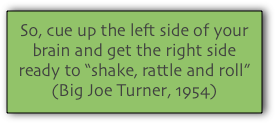by Gary Powell



MUSIC is the only art form that vibrates, resonates, oscillates, pulsates and thumps. This sonic thing makes it our most palpable art form. No other art shakes one’s booty quite the same.
Songwriters work in lyrics, harmony and melody. Composers work in all that plus texture, color, voicings, doublings, sections, combinations of sections and a thousand other devices and nuances. Even with the legacy of attention focused on these compositional elements, there is nothing quite as exciting as having your chest GET POUNDED. We feel music. Literally.
There is method in balancing the elements of sound production and the mastery of that sound is ultimately what a musician does. Singers study tone and placement and every instrument has sonic qualites needing to be either enhanced, disguised or masked. The recording discipline of audio engineering has much to teach us about these audio relationships and especially that of sound and its effects on the human body. There is a scientific language which helps explain this relationship. It has a vocabulary rarely utilized by practicing composers or players. It’s the language of the audio ENGINEER.
 (Copyright 2005 Jesmax Music, BMI)
(Copyright 2005 Jesmax Music, BMI)
Lecture Level and Requirements
Here’s the answer to the question “What happened to all the great songs?” This is the history of popular music as influenced by war and peace, recording technology and the boom box. Can be adapted for any level secondary and above. Inclusive of non-musicians.
All Content of Gary Powell’s Site is Licensed Under a
Creative Commons Attribution-NonCommercial-NoDerivs 2.5 License

.
by Gary Powell



MUSIC is the only art form that vibrates, resonates, oscillates, pulsates and thumps. This sonic thing makes it our most palpable art form. No other art shakes one’s booty quite the same.
Songwriters work in lyrics, harmony and melody. Composers work in all that plus texture, color, voicings, doublings, sections, combinations of sections and a thousand other devices and nuances. Even with the legacy of attention focused on these compositional elements, there is nothing quite as exciting as having your chest GET POUNDED. We feel music. Literally.
There is method in balancing the elements of sound production and the mastery of that sound is ultimately what a musician does. Singers study tone and placement and every instrument has sonic qualites needing to be either enhanced, disguised or masked. The recording discipline of audio engineering has much to teach us about these audio relationships and especially that of sound and its effects on the human body. There is a scientific language which helps explain this relationship. It has a vocabulary rarely utilized by practicing composers or players. It’s the language of the audio ENGINEER.
 (Copyright 2005 Jesmax Music, BMI)
(Copyright 2005 Jesmax Music, BMI)
Lecture Level and Requirements
Here’s the answer to the question “What happened to all the great songs?” This is the history of popular music as influenced by war and peace, recording technology and the boom box. Can be adapted for any level secondary and above. Inclusive of non-musicians.
All Content of Gary Powell’s Site is Licensed Under a
Creative Commons Attribution-NonCommercial-NoDerivs 2.5 License

.





I love music!!! it’s so awesome! that’s why i’ve stuck with it throughout my entire life despite people making fun of me for my love of singing. It’s awesome, and i feel like i really accomplish something when concert’s are over.
i think music really is one of the best art forms!
-brian